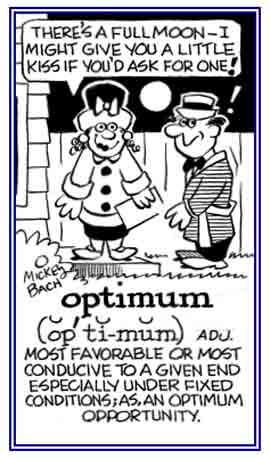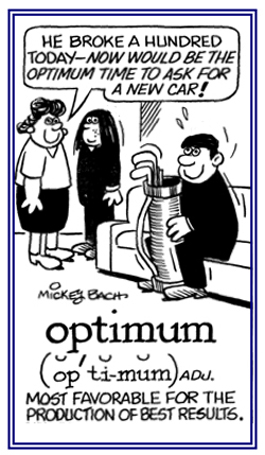2. The point at which the condition, degree, or amount of something is the most favorable: The chemistry experiment was conducted under optimum (ideal or best) conditions.
3. In biology, the most favorable condition for growth and reproduction: The optimum of the results was obtained by the students when they had ideal circumstances (perfect warmth, good soil, sunlight) for planting and growing the pumpkin seeds in their classroom.
4. The best out of a number of possible options or outcomes: From all the choices of new cars at at the dealer’s, Mary chose the optimum for herself with power steering, four doors, light blue color, and the least amount of gas needed for driving.
5. Etymology: from Latin optimum, optimus, "best"; probably related to ops, "power, resources" evolving from "richest" to "the most esteemed".
The word optimum refers to quality, not quantity. It means "best," not "greatest" or "most".
It often happens that the best is also the greatest or the most; as, "The shareholders were seeking an optimum return on their investments", which could be one reason why there is so much confusion about the meaning of the word.


Go to this Word A Day Revisited Index
so you can see more of Mickey Bach's cartoons.
Motto of Emperor King Charles IV of Luxembourg (1347-1378). Shortly after his election, Germany was stricken by the plague, the "Black Death". Incited by religious fanatics, the superstitious people made the Jewish minority responsible for the outbreak of the epidemic and persecution of the Jews and public acts of contrition, including self-flagellation, were undertaken to ward off the plague.
During his reign Charles founded the first university in the Empire (1348). He issued the "Golden Bull" confirming the right to the seven prince-electors to choose all future emperors. The Golden Bull further ruled that all German emperors were to be elected in Frankfurt.
